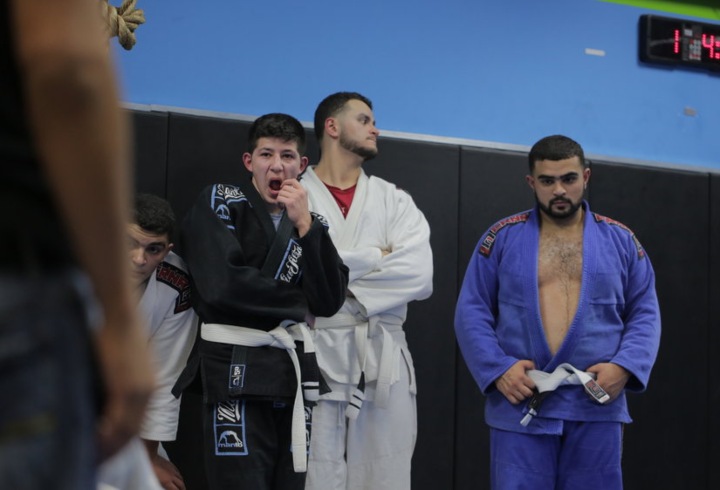As a new Brazilian Jiu-Jitsu student, enthusiasm and dedication will only get you so far. What your instructor didn’t tell you when you first walked through those doors could fill volumes. While the techniques and strategies of this grappling art are complex, the hidden challenges you will face on your journey to mastery are equally demanding. Progress will not come overnight or without struggle.
You will be bruised, exhausted, and at times question why you started this in the first place. But if you persevere, the rewards of skill and self-confidence are life-changing. The key is maintaining realistic expectations, developing mental toughness, and embracing the incremental improvements. Stay focused on your own progress, not that of your peers. With consistency and an open mind, you will build a foundation to last a lifetime.
What your Brazilian Jiu-Jitsu instructor didn’t tell you is that the real opponent on the mat is yourself. Conquer your doubts and fears, strengthen your will, and you will emerge a better student and competitor. The techniques you learn are merely tools – your mindset and determination are the true weapons in this art. Success is measured one training session at a time.
The Importance of Tapping Early and Often
As a beginner in Brazilian Jiu-Jitsu, tapping early and often is critical to your progression and safety.
Repeatedly tapping during live rolling or drills allows you to avoid injury, learn proper technique, and develop an understanding of positions and submissions. Do not hesitate to tap the moment a lock or choke becomes uncomfortable. Your training partners will appreciate your caution, and your instructor will recognize your willingness to learn.
Tapping frequently also provides an opportunity to ask questions about how to properly apply or escape the submission. Take advantage of your instructor’s knowledge and experience. Ask about small details regarding grip placement, posture, and body position. Develop an understanding of both how to execute techniques and how to remain safe while doing so.
Continually tapping and learning will allow you to become comfortable in uncomfortable positions. You will build mental toughness and learn to remain calm under duress. While it can be frustrating to tap repeatedly, focus on progress over perfection. Remain a lifelong student, tap often, and your skills will develop over time.
How to Avoid Common White Belt Injuries
To avoid injury as a beginner, follow these guidelines:
Focus on fundamentals. Drill basic techniques like the bridge, shrimp,
and hip escape. Master fundamentals before progressing to submissions or takedowns.
Tap early. Do not try to endure a submission or escape once a joint is locked in. Tap immediately to avoid sprains or breaks.
Watch your knees and neck. Keep limbs close to your body and avoid extreme ranges of motion, especially when inverting or being stacked. Hyperextending joints can lead to tears or sprains.
Stay within your limits. Do not roll with much larger or higher ranked partners until you build up experience. Size and skill mismatches often lead to injury for beginners.
Rest and recover. Attend classes 2-3 times a week at most. Staying active in between with light cardio and stretching aids recovery, but get plenty of rest. Pushing your body too hard too fast leads to burnout, exhaustion, and impaired performance.
By following the guidance of your instructor, drilling fundamentals, knowing when to tap, protecting your joints, choosing appropriate partners, and allowing for adequate rest, you can build skill and progress in Brazilian Jiu-Jitsu while avoiding many of the injuries that plague beginners. With time and experience, your body will adapt to the stresses of training. Until then, focus on learning, not just surviving.
Ways to Retain Techniques You Learn
To retain the techniques you learn in Brazilian Jiu-Jitsu, consistent practice and repetition are key.
Drill Often
Drilling techniques with a partner helps to ingrain the proper form and movements into your muscle memory. Focus on precision and technique over speed or power. Even practicing solo at home using a heavy bag, dummy, or just shadow boxing the air can keep techniques fresh in your mind.
Review Regularly
Make time to review techniques you’ve learned, whether by asking your instructor for a quick review, watching tutorial videos online, or looking through technique books. Mental visualization of the techniques, grips, transitions and submissions you’ve learned can also help strengthen your memory of them when you’re off the mat.
rolling Resistance
Rolling or sparring with a resisting partner is one of the best ways to retain techniques. Look for opportunities to apply what you’ve learned against progressively more resistant opponents. Start with less experienced partners, then work your way up to those at your level and above.
Keep a Journal
Maintaining a journal to record techniques, tips, grips, and sequences you learn can provide an invaluable reference. Re-reading journal entries periodically helps reinforce your understanding and memory. A journal also gives you material to review when preparing for your next belt test.
Don’t try to improve at everything all at once
As a beginner in Brazilian Jiu-Jitsu, focus on learning fundamentals before advancing to more complex techniques. Attempting to progress too quickly can lead to frustration and hinder your development.
Concentrate on refining essential skills like maintaining proper posture, moving efficiently, and defending yourself against basic attacks. Build a solid foundation in fundamental positions like the guard, side control, and mount. Master key submissions such as the armbar, triangle choke, and cross collar choke.
Become proficient in these core competencies before diversifying into more advanced methods. Approaching your training systematically and progressively will accelerate your learning and enable steady improvement over the long run. With diligent practice of fundamentals, you’ll gain the skills and experience to advance at the appropriate pace.
Film yourself training and analyze your game
Filming your training and reviewing the footage is invaluable for identifying weaknesses in your game and areas for improvement.
Study your matches and rolls.
Analyze situations where you were submitted or points were scored on you. Look for habits or repetitive mistakes in your positioning, grips, or defenses that your opponents were able to capitalize on. Review successful techniques and sequences as well to reinforce what is working.
Repeating this process over time will illuminate the gaps in your skills and understanding, allowing you to develop a focused training plan to strengthen your Brazilian jiu-jitsu. Studying footage of yourself rolling also helps build awareness and understanding of your personal style, tendencies, and default responses under pressure. Such self-knowledge is key to continued progress.
Compete often
Compete often
To progress in Brazilian Jiu-Jitsu, competing frequently is key. Tournaments allow you to gain real-world experience applying techniques against fully resisting opponents in a controlled setting. Win or lose, you will walk away having learned and improved.
Every competition exposes you to new techniques and strategies. Even if defeated in the first round, observe how opponents apply moves so you can incorporate them into your game. Competing often builds mental toughness and the ability to perform under pressure. The more you compete, the more comfortable and confident you will feel.
While attending classes and open mats are important, competing is the only way to truly test your skills. Do not be deterred by a loss; use it as motivation to improve. Compete as often as possible, even at the lower belt levels. Experienced competitors have a significant advantage, so start gaining experience early.
With each competition, your jiu-jitsu will evolve in new ways. You will identify weaknesses to address and have a benchmark to measure your progress. Competing is challenging but rewarding. Make competition a regular part of your jiu-jitsu journey.
Getting good takes a long time
Getting proficient in Brazilian Jiu-Jitsu takes an immense amount of time and consistent practice. Mastery of techniques and progression through belt levels does not happen overnight. Expect the journey to black belt to take 8-15 years of regular training to achieve.
As you progress on your Brazilian Jiu-Jitsu journey, remember that it is a marathon, not a sprint. Do not get frustrated by your lack of progress or skill. Be patient and consistent, show up for class as often as possible, drill the techniques repeatedly and stay focused on the fundamentals. Your instructor likely has years of experience and a wealth of knowledge to share if you ask thoughtful questions. Form a training partnership with someone at a similar skill level to practice with outside of class. Most importantly, tap early and tap often. Your safety and longevity in this sport depend on it. With time and dedication, you will gain competence and confidence. Stay hungry to learn and open to new techniques – your BJJ education has only just begun.


















